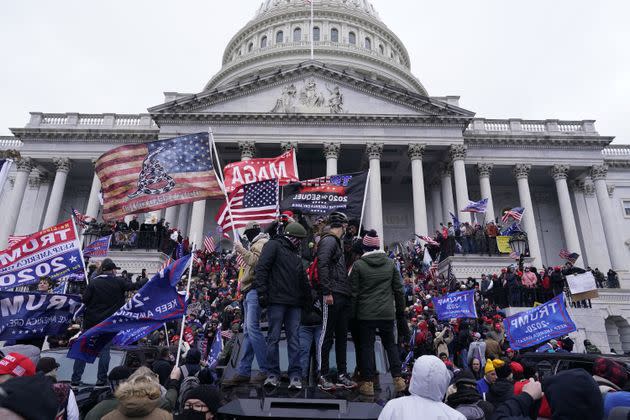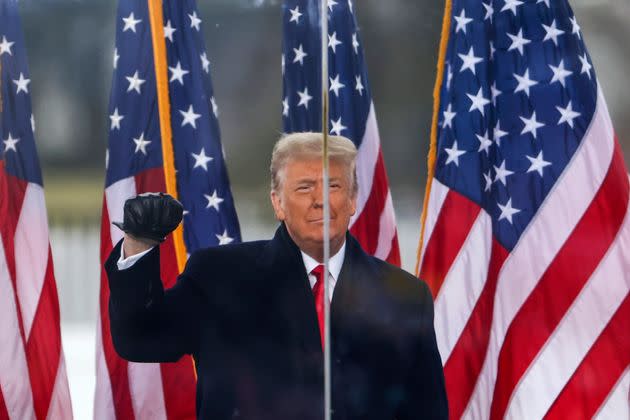The Supreme Court May Throw Out Hundreds Of Jan. 6 Convictions
On Jan. 6, 2021, Joseph Fischer allegedly entered the U.S. Capitol, along with more than 2,000 others, in the effort to stop the counting of the electoral votes that was already underway.
Fischer wasn’t there in his official capacity as a police officer with the North Cornwall Township Police Department in Pennsylvania. He was there to, per text messages he sent that were later cited in a filing by Department of Justice lawyers, “take democratic congress to the gallows.”
“Can’t vote if they can’t breathe..lol,” Fischer allegedly wrote in another text message about his plans before Jan. 6.
Fischer, per federal charging documents, pushed his way into the building with yells of “Charge!” Once inside, he crashed into a line of police officers, according to a cellphone video he recorded. Fischer and at least one police officer were knocked to the ground. Police removed him four minutes later.
Later identified by one of his co-workers, Fischer was arrested by federal officers on Feb. 19, 2021. He was charged with multiple felonies but has yet to go to trial. That’s because he’s appealed one of his charges all the way to the Supreme Court, which will hear arguments on Tuesday.

At issue is a law that makes it a felony if someone “corruptly … obstructs, influences, or impedes any official proceeding, or attempts to do so.” This law — known as 18 U.S.C. 1512(c) — was enacted as part of the accounting reform law passed in 2002, in the wake of the Enron and Arthur Andersen scandals. Federal prosecutors have used it to charge 330 people who were involved in the Jan. 6 attack on the Capitol, including Fischer — and former President Donald Trump.
Fischer argues in his appeal that the provision was not intended to be used in this way. Instead, he claims, a full reading of the law’s text shows that it was only meant to apply to the corrupt obstruction or impediment of documents in an official proceeding. This view revolves around the word “otherwise” in the provision, which reads (emphasis added):
(c) Whoever corruptly—
(1) alters, destroys, mutilates, or conceals a record, document, or other object, or attempts to do so, with the intent to impair the object’s integrity or availability for use in an official proceeding; or
(2) otherwise obstructs, influences, or impedes any official proceeding, or attempts to do so,
shall be fined under this title or imprisoned not more than 20 years, or both.
The main points of contention that emerged in lower courts were how the word “otherwise” should be defined, and how it connects the first subsection to the second.
Fourteen district court judges have upheld charges for obstructing an official proceeding in Jan. 6 insurrection-related cases, on the understanding that “otherwise” means “in a different manner.” This would mean that the language of the first subsection related to the destruction of documents holds no bearing on the second subsection.
But in an appeal to dismiss the same charge when it was brought against Jan. 6 defendant Garret Miller, Judge Carl J. Nichols of the U.S. District Court for the District of Columbia reached a different conclusion.
In his March 2022 decision, Nichols wrote that the word “otherwise” imposes a limit on the second subsection and “requires that the defendant have taken some action with respect to a document, record, or other object in order to corruptly obstruct, impede or influence an official proceeding.”
Since Miller did not attempt to obstruct an official proceeding related to a document, Nichols wrote, that charge against him was dismissed.
Nichols referred to his decision in Miller’s case to similarly dismiss the charge against Fischer.

On appeal, a majority from a panel of the U.S. Court of Appeals for the District of Columbia Circuit disagreed. That ruling determined that the word “otherwise” should instead be defined by the “the commonplace, dictionary meaning” as “in a different manner” and, therefore, the “obstruction” prohibited by law does not refer solely to document-related crimes.
The subsection Fischer was charged under “applies to all forms of corrupt obstruction of an official proceeding, other than the conduct that is already covered by” the first subsection, Judge Florence Pan wrote in an opinion joined in part by Judge Justin Walker.
The appeals court panel, however, was not in full agreement. Judge Gregory Katsas dissented, siding with Nichols’ interpretation that “otherwise” meant “in a manner similar to.”
Katsas’ argument leans on prior court precedent set in the 2015 case Yates v. U.S., which found the definitions of words in legal language should not be interpreted in such a broad manner as to depart from the underlying purpose of the law in question.
Since the provision Fischer is charged with violating was enacted as part of a corporate accounting reform law meant to fix a legal loophole in obstruction charges for shredding documents, Katsas said, the word “otherwise” should be interpreted as operating within that larger context, rather than creating a much broader new kind of felony.
“My colleagues acknowledge the mismatch, but they find it irrelevant because the governing text is unambiguous,” Katsas wrote. “But the text is ambiguous, and this mismatch is another reason for resolving the ambiguity in the defendants’ favor.”
A decision in favor of Fischer would not only dismiss this charge from his prosecution, but overturn convictions or dismiss the same charge against 330 other participants in the Jan. 6 insurrection. That includes Trump, who was charged with four counts related to his actions on and leading up to Jan. 6, including obstructing an official proceeding.
If his charge for obstructing an official proceeding were to be dismissed, however, that would not affect the other three charges Trump faces in the federal case, which is being brought by special prosecutor Jack Smith.
A trial in that case is currently on hold while Trump seeks a ruling from the Supreme Court on whether presidents have “absolute immunity” from criminal prosecution for any official acts committed while in office. The court will hear arguments in that case on April 25 and could rule as late as June 30. If the court were to side with him there, all of Trump’s charges would be dismissed.

